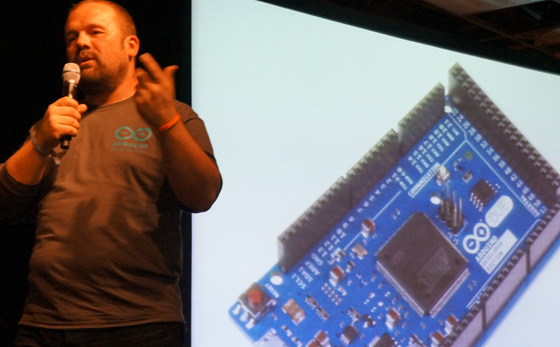The 'maker' community eyes the 'Internet of Things'


Atmel is a $1.8 billion manufacturer of microcontrollers, memory and other foundational electronic and capacitive touch components. It makes wireless components for many markets and applications, from wireless sensor networks to alarm systems. Its technology is found in most non-Apple smartphones. In other words, Atmel is doing pretty well these days.
So why did this major electronics supplier have a big presence at a gathering of garage tinkerers and robotics nerds -- a.k.a makers -- last weekend?
Because devotees of the Maker Faire are part of an emerging market that Atmel believes has big potential.
As we stood on the Faire's expo floor and looked around, Atmel's Open Source community manager Eric Weddington pointed out the many ways that Atmel already plays a role in the maker community.
The DIY drones to our right most likely use Atmel tech in their motor controllers. Robotics to our left, ditto. Anything that uses Arduino also uses Atmel, because its microcontroller is part of the board. Arduino is an open source microcontroller board that comes with free software. The maker set uses Arduino to create many of the objects that were flying around Maker Faire. If it has a switch, sensors, motors or lights, there's a good chance it was made with Arduino.
At the show, Massimo Banzi announced to a packed room of Arduino fans that the next iteration of the boards, called Arduino Due (Italian for two), are being rolled out. The new board is faster and significantly more capable than the Uno board it replaces, said Weddington.
Open source being all about collaboration and sharing, Banzi announced that Arduino will give away the first 100 Due boards. Of that group, "the 10-15 people who really help us out by contributing to the discussion will be placed in a special beta team, and each time Arduino releases something new, you'll be the first to try [it]," he said.
For Atmel, the potential of its collaboration with Arduino goes beyond DIY drones and home-brewed robots. It stands to benefit from the role electronics will increasingly play in intelligent products -- that is, products with embedded technology that will allow consumers and manufacturers alike to share information about products' condition, location, environment, etc. That's possible with a smartphone. Some day, it will likely be possible with your bicycle, your favorite jacket, or even the jug of milk in your fridge. These products and the network to support our wireless communication with them comprise the internet of things.
Major manufacturers have their eyes on this, but so does the maker community. Plus, experimenting and tweaking electronics into new products and applications isn't just for hobbyists, Weddington pointed out. It's also happening at the university level. Actually, it's even happening at the grade school level -- an entire wing of the Maker Faire grounds were dedicated to educational vendors, speakers and makers. And Google's Eric Schmidt just pledged Arduino kits to more than 100 computer science teacher-in-training in the UK. He'll also give them Raspberry Pi, a $45 educational Linux computer board.
Image: Mary Catherine O'Connor
This post was originally published on Smartplanet.com